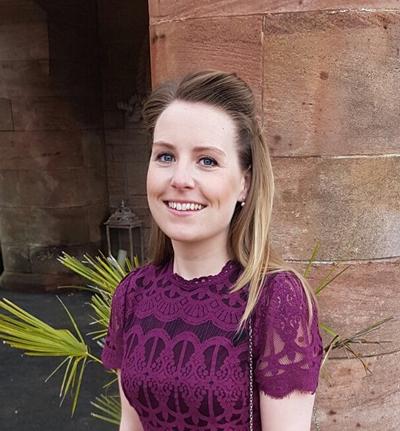Hannah James MSc Audiology, 2014
Audiologist

Audiology at Southampton is part of The Institute for Sound and Vibration Research (ISVR), where world-renowned research has been conducted in Audiology and a number of related areas.
What made you choose Southampton?
When I began my search for universities I soon realised that there were only a handful in the country that offered an MSc course in Audiology. From my research, I learnt that Southampton offered a world-renowned course, so there was no uncertainty that I wanted to study for my MSc here.
What were your Southampton ‘highlights’?
From the outset, I had a brilliant time studying at Southampton. Although the MSc cohort was small this enabled us to form a tight knit group; throughout the course we worked collaboratively and were very supportive of one another. This was invaluable in helping to somewhat ease what was a challenging year. Moreover, it resulted in me forming some really great friendships which have continued beyond university life, despite us all having settled far and wide across the country!
Did you have any exposure to employer involvement or research-led learning during your course? Did this help you join your chosen field or industry? If so, how?
The Audiology department is part of The Institute for Sound and Vibration Research, where world-renowned research has been conducted in a number of related areas, including Audiology. As a student, I had exposure to research-led learning in a number of ways. Firstly, lectures were conducted by those individuals performing research in the field of Audiology. Secondly, I participated in various recent projects and conducted my own research project and, lastly, many course modules required literature reviews.
Research-based evidence is a very crucial part of health care in delivering safe and effective practice, so it is very important to be exposed to research-led learning from the outset.
What did you enjoy most about your course?
I liked the combination of lecture-based learning and hands-on practical sessions.
The practical sessions were designed to enable you to perform various procedures in a friendly group environment. This allowed me to consolidate my knowledge of the various protocols and their underpinning theory.
In addition, we attended group seminars which were always conducted in a relaxed manner. This allowed non-critical discussions to take place, relieving any apprehension regarding asking questions.
Most importantly, I always felt the University’s lecturers and supervisors were all very approachable and supportive throughout the course.
What networking, employment and work experience opportunities did you undertake and did they enhance your Southampton experience?
As a student audiologist, you can register with societies and associations, and attend conferences. During my time at Southampton I attended a Student Conference held by the British Audiology Association. This helped to expose me to the variety of companies out there offering hearing aid devices and products, in addition to introducing me to various avenues following graduation.
Prior to studying for an MSc in Audiology I had a keen interest in cochlear implants. I had previously conducted research in this field during my BSc degree in Psychology. The MSc course included a compulsory module in Cochlear Implants which I thoroughly enjoyed, and I wanted to gain as much experience in this area as I could. As a result, I contacted two cochlear implant centres in the country and I was fortunate to be able to attend both, gaining some invaluable experience.
What is Southampton like as a place to study?
Southampton is a great place to study. It offers a thriving, picturesque campus full of friendly faces and a variety of means to immerse yourself into university life.
What have been the highlights of your career to date?
Since completing the MSc and leaving Southampton, I have been employed within the NHS and gained my clinical competencies, enabling me to register as an audiologist. Hearing is undoubtedly a fundamental aspect of daily life. I am proud to be part of an organisation like the NHS; it is very rewarding to provide a valued service to those with hearing difficulties.
Last year I undertook the ‘Mentorship in Professional Practice’ university course to develop the skills and knowledge required to provide mentorship on a professional level. I really valued the support and guidance I received as a student when studying for my clinical competencies. Therefore, once I had qualified, I wanted to be in a position where I could provide the same support and guidance to future Audiology students. Completing the course has enabled me to achieve this, and added another rewarding attribute to my career.
How did your time at Southampton help you to grow as a person and help you get to where you are now?
My time at Southampton helped my confidence to grow; not only did I find my independence but it helped me to recognise my abilities.
What advice would you give to a student starting their degree at Southampton?
Enjoy every moment! Immerse yourself in university life, join a society and try something new! University is a unique experience that will provide you with memories for life. Make sure that you develop a good ‘work/play’ balance so that you fulfil the requirements of your degree but equally allow yourself to enjoy a good social life.
What tips would you give to current students looking to start a career in your sector? What could they be doing now to make themselves more employable when they graduate?
If you are looking to start a career in Audiology (with no prior Audiology background) and are considering the MSc you need to be self-motivated; not only to gain the required knowledge, but to acquire as much clinical experience as you can, whether this is prior to the course commencing or during the course itself.